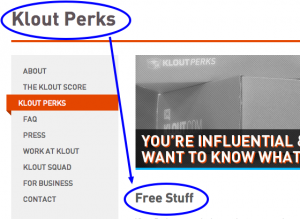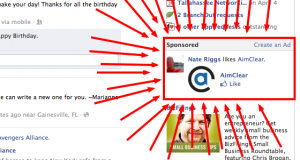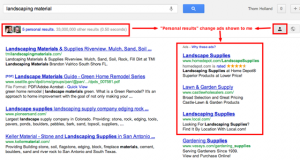 Today’s guest post is written by Thom Holland.
Today’s guest post is written by Thom Holland.
Which do you trust more, an advertisement on TV or the word of mouth recommendation that you got from a friend?
Your friend …of course.
As marketers, you already know that.
We’ve always known the best customers come from word-of-mouth referrals. They cost less money to acquire and they typically remain a customer for a longer period of time.
Great entrepreneurs know how to leverage success. They’re able to get happy clients to convince their friends to become new clients.
During the past decade, advertisers have been hard at work, racing to see who can create a business model that successfully capitalizes on people’s social relationships.
First, let’s look at a few examples of companies attempting to put this idea to work but most importantly, I’m interested in how we an apply it to our own businesses.
Three Examples of Monetized Word-of-Mouth Business Models
- Klout Perks

As most of you know, Klout is a tool that tracks how “influential” you are and gives you a score based on your level of influence. They partner with businesses and offer influential individuals “perks” (free stuff from the business).For example, if Klout thinks you are influential about shoes they may convince Nike to give you a pair of free shoes. The thinking is you will talk about them, your friends will listen to you, and they will want to buy the same pair of shoes.
- Facebook
 You’ve probably noticed their “sponsored” ads on the right side of the screen. The idea is pretty simple; when you “like” something on Facebook, businesses can advertise to your friends that you liked that particular item.
You’ve probably noticed their “sponsored” ads on the right side of the screen. The idea is pretty simple; when you “like” something on Facebook, businesses can advertise to your friends that you liked that particular item. - Multi-level marketing networks
Marketing pyramids have long since moved products for companies by tapping into people’s social networks. In return, they typically get a commission from each sale.The interesting innovation here is a few of these networks, such as FHTM, are now selling services that “you already use.” In other words, individuals within the multi-level marketing network make recurring revenue from services such as TV and cell phone bills.
So…is Google getting left behind?
…not likely.
Google is moving towards more personalized advertising; they’re just being a bit more discreet about it.
We know Google personalizes search results based on search history. However, they are now attempting to use insights from social circles as well.
Consider the screenshot above. When set to personalized results, ads appear with reviews that were created by friends. When switched, the ads go away completely.
What does this mean for businesses?
Position yourself for success.
Let’s face it, whether or not we’re okay with where advertising is going, we probably won’t be able to stop it.
It’s a trade-off. In order to provide better and cheaper products, businesses need more detailed information about their target audiences.
The question is, how can you position yourself to capitalize on this evolution?
Two thoughts come to mind:
- Build relationships. You need to focus on building a business relationship with your partners. Grow your networks with every day people. The goal here isn’t to exploit these friendships but to help people when it’s appropriate. Whether you’re talking to the IT guy or the CEO, treat them both with respect and understand they are both incredibly valuable.
- Don’t forget the basics. Things change but it doesn’t mean you should throw away the fundamentals. Continue to keep in mind things like customer acquisition costs and customer lifetime value.
Your turn. What are your thoughts?
Here are a few questions to get the discussion started. I’m curious to hear what you think.
- What other businesses are attempting to create a business model capitalizing on social relationships?
- Which business model do you think will prevail?
- What are some additional ways to capitalize on these trends?
- How much of a privacy issue does all of this present?
Thom Holland is the co-founder and CEO of Beckon.
